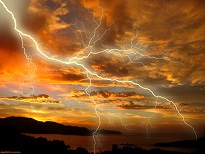 In the aftermath of violent storms and tornadoes, residents of Oklahoma have been in the national spotlight recently.
In the aftermath of violent storms and tornadoes, residents of Oklahoma have been in the national spotlight recently.
It’s touching to see so many people unite to help their devastated neighbors.Â
In times like these, people often struggle to make sense of the sovereign work of God in the outworking of such storms and devastation. Yet God assures us, He is in control of this.Â
God’s providences are mysterious from earth’s perspective – and often, like Hebrew sentences, they must be read in reverse.
And even in distant hindsight, we can still only correctly interpret their fullest meaning from heaven’s perspective.Â
Even though we can acknowledge the value of human warnings and emergency shelters, the fact remains that God determines exactly what’s going to happen when any storm comes and He determines exactly who will be affected and to what extent.Â
When a great wind storm struck the children of Job and killed them instantly (Job 1:18-19), he didn’t sin with his mouth; he didn’t charge God with wrong. He said,  “The Lord gave and the Lord has taken away; blessed be the name of the Lord.â€
The principle to note here is that God has not done anything wrong or violated anyone’s rights when people die in any way. Because of sin, death is prevalent.Â
God does not need to be forgiven by anyone because God hasn’t done anything wrong when someone dies. We are all going to die in some way or another, and some of us will die sooner than others. In a fallen world, death is prevalent.
But God is so gracious to His fallen creation. The wondrous thing is that there isn’t more death around us every day due to sin and natural disasters. We are surrounded by daily mercies that are innumerable and totally undeserved.Â
This is an expression of God’s common grace.Â
However, we can become so accustomed to God’s grace and mercy that when anything interrupts that flow of blessing, we may feel and act as if we’ve been violated.Â
Life and death are in His hands. To quote from Job 14:5, it says, “Our time on earth is brief; the number of our days is already decided by You.†[CEV]
And in Psalm 139, verse 16, “In your book were written, every one of them, the days that were formed for me, when as yet there was none of them.†[ESV]
The day of my death and yours is already known.
Our death has already been determined by God. If you know and trust God, that’s a comforting thought for you; if you don’t, then it isn’t. But it means that not one adult or little baby ever dies prematurely according to God’s plan or purpose.
Sudden death appears very different from our limited, human perspective. But our comfort comes from remembering God’s perspective as revealed to us in Scripture.Â
God knows the day and cause of our death from the beginning.
In James 4:14-15, it says “What is your life? For you are a mist that appears for a little time and then vanishes. Instead you ought to say, “If the Lord wills, we will live and do this or that.â€Â
The principle is, our lives are all very brief and transient compared to eternity. Life is very short; eternity is very long.
Before we are conceived, God knows the exact number of hours we will live; He knows the exact allotment of heartbeats in our chest and nothing – absolutely nothing – can alter that destiny.
God already knows how and when each of us will die. We can trust Him with our death and we must do so. None of us can add one cubit to the length of our days.
Should we worry or be anxious about death and its many causes? Jesus said in Matthew 6:27, “Which of you by being anxious can add a single hour to his span of life?â€
When people die, it’s usually not because they are more deserving of death than any of the rest of fallen humanity. None of us deserves to live any longer than anyone else.
God doesn’t owe us anything. None of us are entitled to a long or pain-free life. Such expectations are sure to disappoint.
But Jesus reminded everyone in Luke 13 that since death is a fact for all humanity, those who are still living must repent before death comes, lest we perish after we die.
All men die, but not all must perish after death.
Since any of us could be killed in a sudden calamity at any time, we should all repent and be reconciled to God before death. Now is the only time we have to repent.Â
As Christians, our response when devastation and calamity happen to us is given in 1 Peter 4. It’s in verse 19 at the very end of the 4th chapter, where Peter writes,
“Therefore let those who suffer according to God’s will entrust their souls to a faithful Creator while doing good.â€
God is saying through Peter, that we should keep doing good while we still have life. Help the survivors, mourn with those who are grieving, and give to those who have any needs.Â
Since things like this happen all the time, whether there are tornadoes or earthquakes or tsunamis, or volcanic eruptions we will see this kind of thing again and again in this life.Â
The primary difference between believers and unbelievers during these situations is how we view God in the midst of suffering and devastation.
Natural disasters like this expose what people really think about God.Â
Storms and calamities in this life have a way of correcting our presuppositions and expectations. This can be a very painful and jarring experience for some of us.
But all such corrections are manifestations of God’s grace to us.Â
So as we mourn with those who are mourning, let us also think biblically about God and life and death and the storms that come to us. And let us repent while we still have life.
With love in the Truth,
Pastor Kevin
.

